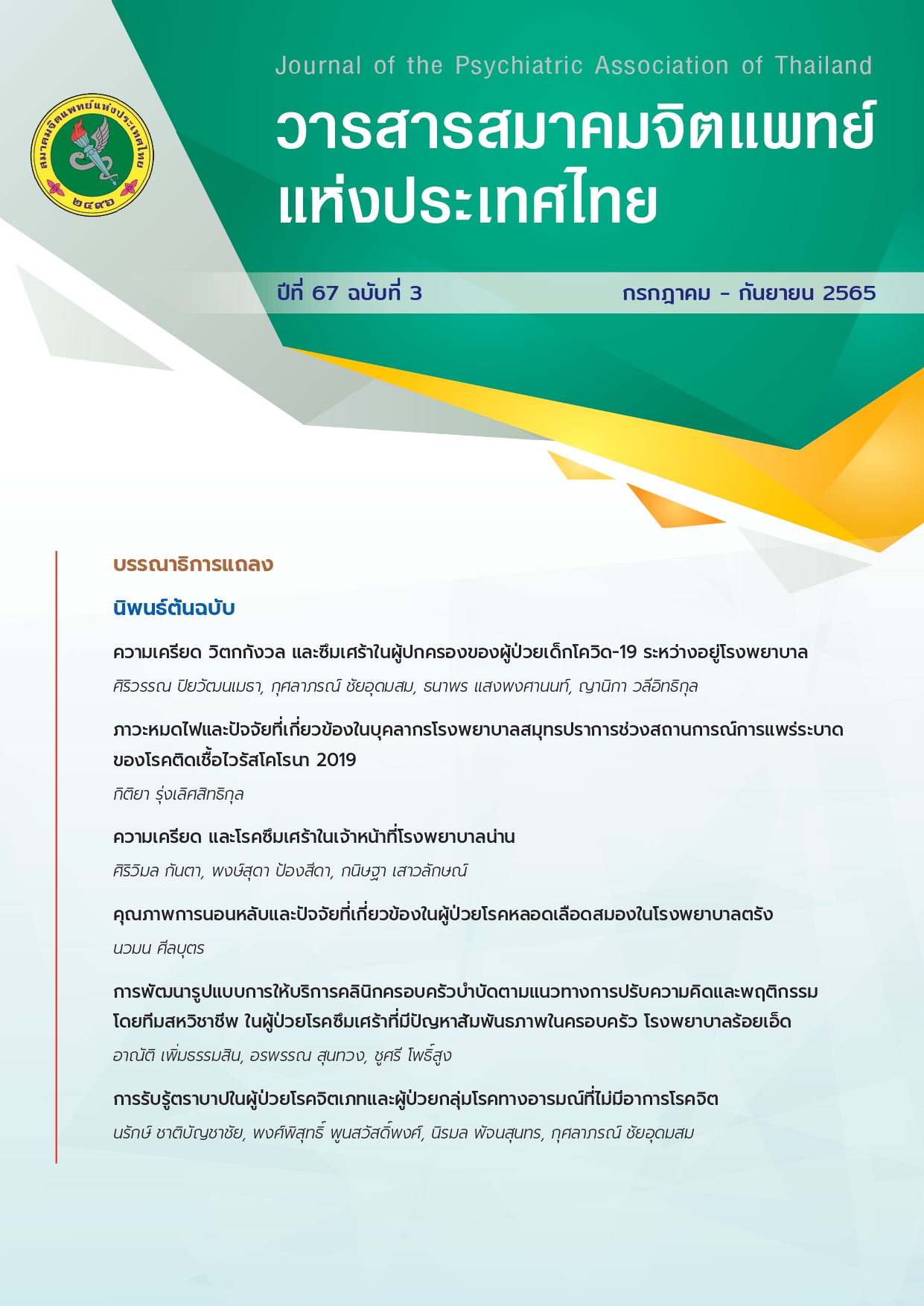Development Cognitive Behavior Family Therapy by a Multidisciplinary Team in Depressive Patient with Family Relationship Problems at Roi-Et Hospital
Main Article Content
Abstract
Abstract
Objective: To develop Cognitive Behavior Family Therapy in depressive patients with family relationship problems
by a multidisciplinary team in Roi-et Hospital.
Methods: This is a research and development study. The research sample group was a multidisciplinary team of depressive patients and their families. The study was divided into 3 phases: Phase 1 studied the situation of Cognitive Behavior Family Therapy in patients with depressive disorder. Phase 2 was the development of Cognitive Behavior Family Therapy by a multidisciplinary team in depressive patients with family relationship problems. Phase 3 was the study of the outcomes of Cognitive Behavior Family Therapy by a multidisciplinary team. The research instrument was Cognitive Behavior Family Therapy. The researchers were trained and experienced in family therapy and CBT. The instrument was assessed and received feedback from family therapy and CBT specialists. Experts determined the validity of content. The tools used to collect data included: a group discussion questionnaire, the 9-question Depression Symptom Scale and the Family Relationship Assessment Scale. The data was collected between December 2019 and September 2020.
Results: 1) It was found that the families still lack participation in the therapy. There were no clear guidelines for the service provision. The service was separated by profession. 2) The service model consisted of six weekly sessions with three therapists, including a psychiatrist, a psychiatric nurse, and social workers. The first session was about understanding depression and family relationships. The second session was about finding and analyzing dysfunctional thinking and family relationships that affect depressed mood. The third session was about recognizing dysfunctional thinking and family conflict. The fourth session was thought-checking. The fifth session was to develop skills to modify dysfunctional thinking and positive communication in the family. The sixth session was goal setting and ends therapy. 3) The results showed that after the treatment, all 5 depressive patients had no depression and the family relationship scores of the depressive patients and their families were good in all 5 families.
Conclusion: This research focuses on the process of developing a Cognitive Behavior Family Therapy clinic by a
multidisciplinary team. Therefore, there is a limit on the number of samples. Quasi-experimental research should be
continued to be able to demonstrate the effectiveness of therapy more clearly, and there should be much greater
long-term follow-up after therapy.
Keywords: Family therapy, Cognitive Behavior Therapy, Depression
Article Details

This work is licensed under a Creative Commons Attribution-NonCommercial-NoDerivatives 4.0 International License.
Articles submitted for consideration must not have been previously published or accepted for publication in any other journal, and must not be under review by any other journal.
References
World Health Organization. Depression and Other Common Mental Disorders: Global Health Estimates.2019.
Department of Mental Health, Ministry of Public Health. Annual report 2021. Bangkok.
Roi-et hospital, Ministry of Public Health. Annual report 2021. Roi-et.
Beck T. Depression: Causes and treatment (2nd ed.). Pennsylvania: University of Pennsylvania Press. 2009.
Beck T. Cognitive behavioral therapy: Basic and beyond. (2nded). New York: The Guilford press; 2011.
Jeerasup N, Dukhawaha S, Saguanrum K, Kenbabpha K, Dit-ung H. Development and test effectiveness of a school-based cognitive behavioral group therapy for depression in adolescents. J Psychiatr Assoc Thailand 2020; 65: 47-62.
Palee A. Effects of brief cognitive behavioral therapy program for patients with major depressive disorders receiving services in the adult psychiatric ward, Maharaj Nakorn Chiang Mai Hospital. APPJ 2021; 37(3): 190-201.
Yokchoo B. Effectiveness of implementing the Cognitive Behavior Therapy Multi-Channel Program among persons with major depressive disorder, Bannadoem hospital, Suratthani Province. Region 11 Medical Journal 2022;35(1):98-113.
Idsoe T, Keles S, Olseth A, Ogden T. Cognitive behavioral treatment for depressed adolescents: results from a cluster randomized controlled trial of a group course. BMC Psychiatry 2019; 19: 155-65.
Purmtummasin A. The factors influencing to level depression of depressive disorder in Roi-et Hospital. Mahasarakham Hospital
Journal 2019; 13(2): 87-96.
Trangkasombat U. Family therapy and family counseling. 5th Edition Bangkok: Santa Print. 2001.
Kaewsawang T, Rungwittayanuwat P. Cognitive behavior family therapy: review article. Journal of Humanities and Social Sciences Valaya Alongkorn 2020; 15(1): 1-17.
Friedberg D. Cognitive-behavioral approach to family therapy. J Contemp Psychother 2006; 36(4): 159-165.
Patterson T. A cognitive behavioral systems approach to family therapy. J Fam Psychother 2014; 25(2): 132-44.
Asarnow R, Hughes J, Babeva N, Sugar C. A cognitivebehavioral family treatment for suicide attempt prevention: a randomized controlled trial. J Am Acad Child Adolesc Psychiatry 2017; 56(6): 506-14.
Kaslow N, Broth R, Smith O, Collins M. Family-based interventions for child and adolescent disorders. J Marital Fam Ther 2012; 38: 82–100.
Kongsuk T, Arunpongpaisal S, Janthong S, Prukkanone B, Sukhawaha S, Leejongpempoon J. Criterion-related validity of the 9 questions depression rating scale revised for Thai Central Dialect. J Psychiatr Assoc Thailand 2018; 63: 321-34.
Intasithi J. Family relationship and attitude toward pregnancy of pregnant women with nausea and vomiting. Master. Nursing Science (Maternal and Child Nursing). Mahidol University. Bangkok (Thailand). Graduate School. 2002.
Minuchin S. Families and Family Therapy. Cambridge, MA: Harvard University; 1974.
Lang A. Family structure, family functioning, and well-being in adolescence: A multidimensional approach. Int. J Human Soc 2018; 8(2), 24-31.


